What's Happening?
President Trump has increasingly utilized the National Guard in Democratic-led cities to address crime, quell protests, and support ICE operations. In Washington, D.C., Guard members have been involved in patrolling streets and beautification projects, including clearing trash and pruning trees. The administration has also deployed troops in Oregon and Illinois to safeguard ICE facilities, while in Missouri, Guard members assist with data entry and logistical support. Military experts, including Retired Maj. Gen. William Enyart, express concern that these deployments stray from the Guard's traditional roles, such as aiding during natural disasters and emergencies. The National Guard Bureau has declined to comment on these developments.
Why It's Important?
The deployment of the National Guard in non-traditional roles under President Trump's administration has sparked debate about the potential impact on recruitment and public trust. Military experts worry that these assignments may disrupt the civilian lives of Guard members, affecting their jobs and education, and placing a strain on their families. Retired Maj. Gen. Randy Manner has voiced concerns that frequent and far-reaching use of the Guard could drive a wedge between the American public and the military. The situation highlights the tension between political leadership and military operations, raising questions about the appropriate use of military resources in domestic affairs.
What's Next?
The continued use of the National Guard in these roles may lead to further scrutiny from military experts and policymakers. There is potential for increased debate on the balance between military involvement in domestic issues and traditional emergency response roles. The impact on recruitment and public perception of the Guard could prompt discussions on policy adjustments or legislative oversight. Stakeholders, including political leaders and civil society groups, may seek to address these concerns to ensure the Guard's missions align with its historical and intended purposes.
Beyond the Headlines
The evolving role of the National Guard under President Trump's administration may have long-term implications for civil-military relations in the United States. The ethical considerations of deploying military forces for domestic law enforcement and support operations could lead to broader discussions on the separation of military and civilian roles. Additionally, the strain on Guard members and their families may prompt a reevaluation of support systems and resources available to part-time service members.











